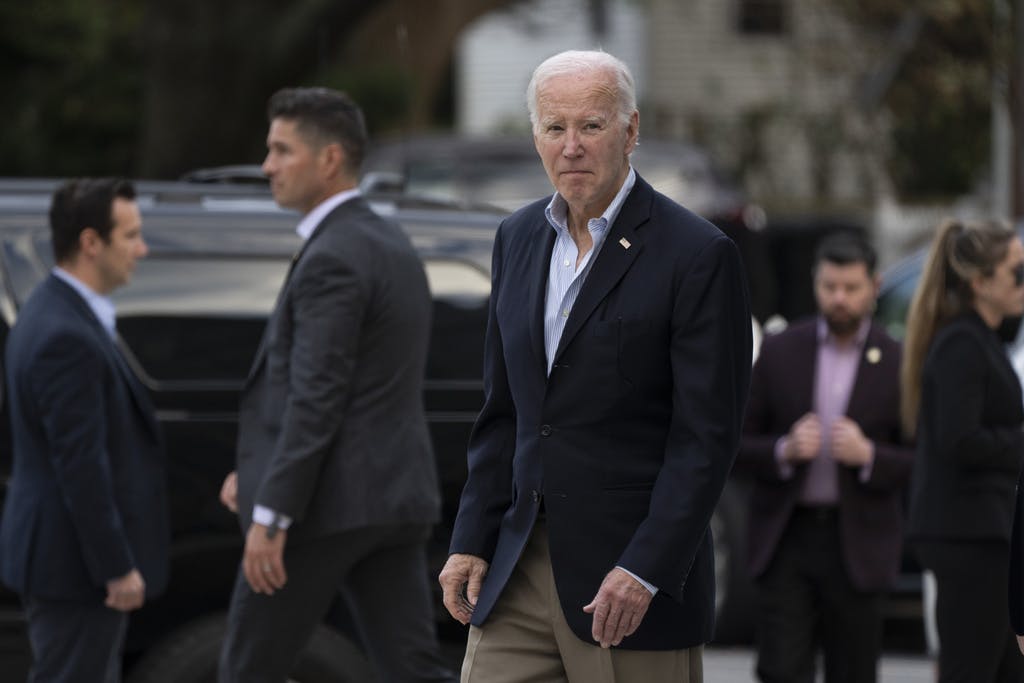Could Trump Call Biden as a Witness? The President May Face Grilling Over Allegations of Political Persecution, Abuse of Office
To Nixon from Jefferson, America’s chief executives have had to reckon with subpoenas.

The holiday season could bring for President Biden, courtesy of his predecessor, a lump of coal — a subpoena to testify in federal court. It’s a stocking stuffer that would set up a heavyweight political showdown not just in the court of public opinion, but also in the courtroom.
The spectacle of the former president summoning to court the one who now sits at the White House surfaces as Special Counsel Jack Smith’s prosecution of President Trump for allegedly attempting to overturn the 2020 election continues apace and on schedule. The 45th president maintains that the case is political and has sought to spotlight the president who ultimately oversees the prosecutors.
Now, deadlines are approaching for Mr. Trump to provide the list of witnesses he intends to call for his defense. While these rosters are not binding, they will suggest the strategic contours of the case. If Mr. Trump intends to argue that the case is politically motivated, then one could expect political figures to be on his list. Could that list include the holder of the highest position in the land?
On Truth Social and in court filings, Mr. Trump argues that the two federal criminal cases against him — for January 6 and the retention of classified documents at Mar-a-Lago, both prosecuted by Mr. Smith — are politically motivated and emanate from the highest echelons of this administration. Mr. Trump has said that a “corrupt sitting president had his top political opponent arrested on fake and fabricated charges.”
When the January 6 charges against Mr. Trump were handed up, the former president noted that “this is a ridiculous indictment against us — it’s not a legal case. It’s an act of desperation by a failed and disgraced crooked Joe Biden and his radical left thugs.” In arguing against the gag order imposed by Judge Tanya Chutkan, Mr. Trump has cited his political persona, and Mr. Biden’s.
Mr. Smith is employed by the Department of Justice, at whose head sits Attorney General Garland, who has denied that “partisan considerations” play any role in the decision to prosecute Mr. Trump. While the special counsel statute dictates that Mr. Smith can only be fired for “good cause,” the executive powers of the United States are vested entirely in one man, the president.
Mr. Garland has long insisted he is immune to politics, but the Department of Justice’s aggressive prosecution of Mr. Trump, at the hands of Mr. Smith, may speak otherwise. In April, the New York Times reported that the “attorney general’s deliberative approach has come to frustrate Democratic allies of the White House and, at times, President Biden himself.”
The Times added that “Mr. Biden confided to his inner circle that he believed former President Trump was a threat to democracy and should be prosecuted.” Seven months after this report, Mr. Garland appointed Mr. Smith.
The president is the only figure to whom the Constitution assigns the burden to “take care that the laws be faithfully executed.” Does that make him suitable for a subpoena? In 1876, President Grant voluntarily testified on behalf of his private secretary, General Orville Babcock, who was implicated in the Whiskey Ring, which involved the diversion of tax revenues and a bushel of bribes. Babcock was acquitted.
Nearly a century later, the Supreme Court would hold in United States v. Nixon that the president was required to respond to the request by prosecutors to hand over tapes concerning Watergate. Nixon argued that executive privilege shielded him from handing over the audio. The court, though, held that “the fundamental demands of due process of law” meant that presidents are subject to subpoena. Nixon resigned, mooting the question.
In 1997, the Nine rejected the argument proffered by President Clinton that subpoenas “rise to the level of constitutionally forbidden impairment of the Executive’s ability to perform.” Mr. Clinton would later be forced to sit for a deposition by attorneys for a civil servant, Paula Jones. He was impeached for lying during that deposition about his relationship with an aide, Monica Lewinsky.
The high court’s ruling in the case concerning Mr. Clinton was reaffirmed in Trump v. Vance, where the court held that the “public has a right to every man’s evidence,” including that of the president.
At the dawn of the Republic, Chief Justice Marshall, presiding over Aaron Burr’s trial for treason for efforts to raise an armed force to take New Orleans, ruled that President Jefferson was subject to subpoena for a document relevant to the case and to Burr’s defense. The chief wrote that Jefferson and his successors were not “exempt from the general provisions of the constitution.”
The most famous articulation of the opposing point of view came from Jefferson himself, who, in a letter to George Hay, wrote that subjecting a president to the court system’s impositions would “bandy” the chief executive “from pillar to post, keep him constantly trudging from North to South & East to West, and withdraw him entirely from his constitutional duties.”
Congressional subpoenas against sitting presidents are more constitutionally fraught, a salient reality for the congressional Republicans investigating the president’s son, Hunter Biden. Courts have held that compelling the president to appear before lawmakers violates the separation of powers. Some, though, including George Washington, have done so voluntarily.
Federal law allows anyone served with a subpoena to file a motion to quash the request. That filing “must include the reasons why compliance with the subpoena should not be required or the reasons why the subpoena’s scope should be limited.” Merely writing it on Oval Office stationery, it appears, will not suffice.

